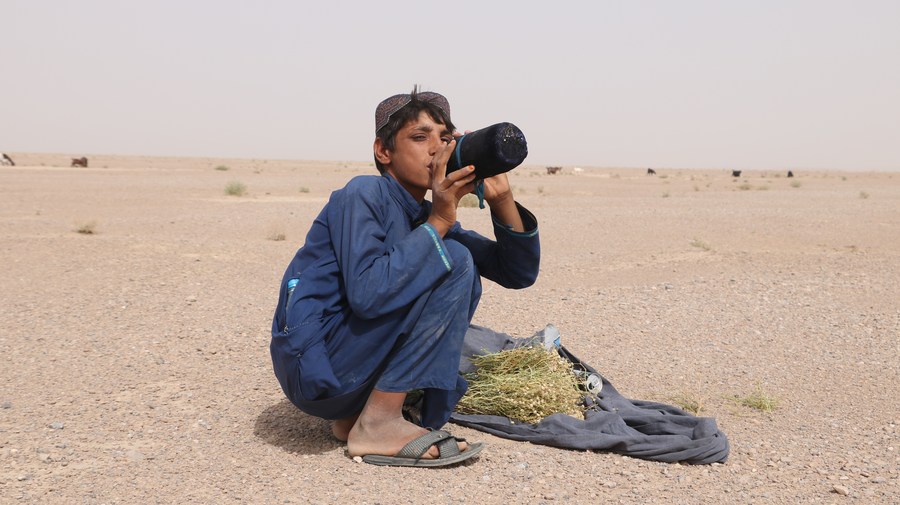As reports have been revealing the recent banditry of U.S. forces looting more crude oil in Syria, it is fair to say that Washington has been stealing during every overseas war, not to mention during its two-decade-long stay in Afghanistan.
At the end of August 2021, the last U.S. troops left Afghanistan, but the U.S. presence still has a negative influence on the nation’s economy. In fact, the U.S. invasion and occupation have created a “black hole” in Afghanistan’s economy by sucking up a lot of wealth that now remains unaccounted for.
According to the latest United Nations Strategic Framework for Afghanistan, released in early July, Afghanistan’s economy contracted by about 30 percent between 2020 and 2022. There are 24.4 million Afghan people in need of humanitarian assistance, and a staggering nine people out of 10 live in poverty.
Agriculture has been the first victim of the war-ravaged country’s economic sectors. Large areas of land where Afghans used to farm are now useless, as countless ordnance, including the bomblets of notorious cluster bombs, were left under the soil by the U.S. troops, who never had any intention of clearing them.
Sadiq Shinwari, an Afghan military expert, told Xinhua that unexploded bombs have led to grave consequences for Afghanistan’s agriculture, on which the landlocked country’s economy is mainly dependent.
The Pentagon has called back its “patriots” while doing nothing to clean up their mess. The “humanitarian aid” the White House bragged about has also turned out be nothing but propaganda.
An electricity-generating facility, including several rows of diesel storage tanks, in the southern city of Kandahar has been abandoned and is no longer in use. Some roads the United States had built were bombarded beyond recognition by the U.S. troops. The real economic and social impact on the locals was the last thing Washington considered before hastily pulling its troops out.
“We did not go to Afghanistan to nation-build. And it’s the right and the responsibility of the Afghan people alone to decide their future and how they want to run their country,” U.S. President Joe Biden said in a briefing on the U.S. army’s withdrawal from Afghanistan in July 2021.
The dire situation worsened following the Biden administration’s decision to freeze some 7 billion U.S. dollars’ worth of assets of Afghanistan’s central bank.
The truth is that weaponizing the dollar has resulted in rising prices, less imports of living necessities, and a paralyzed financial system in Afghanistan. Even in the most-developed city Kabul, there has been no municipal water supply system, urban public transport, or sufficient power supply. Many Afghans live in adobe dwellings on the mountains.
The White House decided last February to use the frozen assets to compensate the families of victims of the 9/11 attacks, but what about Afghanistan’s underage children peddling goods among the roaring traffic? What about the orphans curled up unattended against the walls? Afghan citizens are not able to withdraw money from the banks or afford escalating prices brought about by sanctions.
Aqa Mohammad Shirzad, head of the malnutrition ward of the Kabul-based Indira Ghandi Institute of Child Health, told Xinhua that before the sanctions, the hospital used to admit around 600 malnourished children every year. Since the sanctions took effect, that number has doubled.

A boy drinks water on an arid land amid hot weather in Herat Province, Afghanistan, July 26, 2023. (Photo by Xinhua/Mashal)
The brutal sanctions have hindered foreign direct investment and imports, and the Afghan health system has been crumbling due to less medicine and international aid.
Chinese Foreign Ministry spokesperson Wang Wenbin said on Tuesday that what happened in Afghanistan marked a military, political and counter-terrorism failure of the United States in Afghanistan, and once again proved that military intervention, political infiltration and “democratic transformation” from the outside will not work and will only breed turmoil and disaster.
With military expansion and coercive financial statecraft, Uncle Sam tramples the land of many sovereign states and wrecks their economies. Whatever legal rationale is being provided by Washington, it is laundering the wealth of the Afghan people and ensnaring the nation in a cycle of stagnation and decline.










